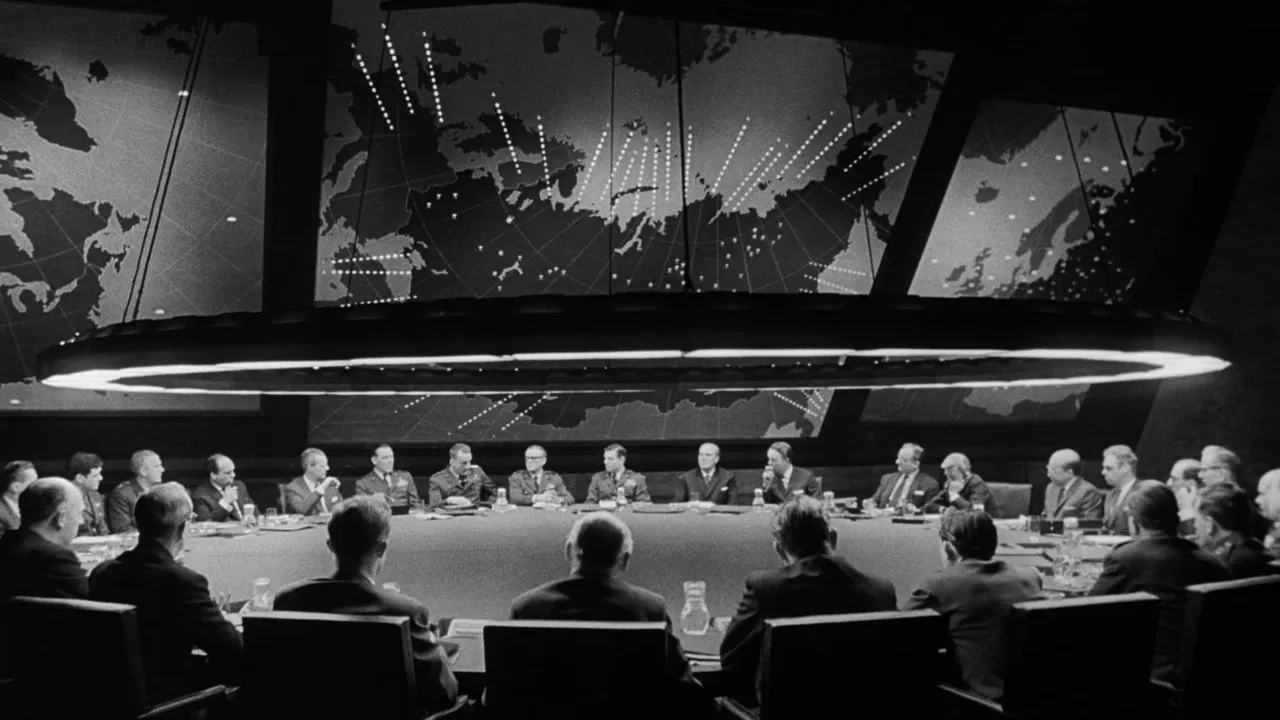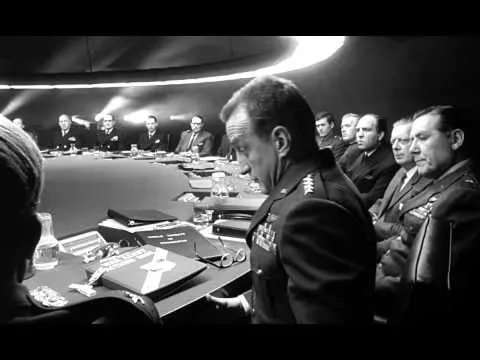
In almost any area of the human endeavour true greatness is measured not in great achievements, but in the obstacles that had laid in their path. So, the truly great filmmakers aren't those who made good or great films, but those who defied the odds in doing so. One of the best examples is great Stanley Kubrick, whose best known and most cherished contributions to the Seventh Art sprang up from the various bizarre challenges he had taken as a filmmaker. In early 1960s one of those seemingly impossible task was the idea to take the most depressive subject imaginable – the end of the world, which in Cold War era was supposedly more realistic prospect than it is today, and, as such, more frighteningto the audience - and use it as basis for comedy. The result of Kubrick's efforts was Dr. Strangelove, 1964 comedy which is considered to be one of the greatest films ever made.
The plot of the film is based on the novel by Peter George, Cold War thriller that dealt with the possibility of accidental start of nuclear holocaust. In the script by Terry Southern and Stanley Kubrick, events leading to the crisis aren't the aftermath of an accident - USAF general Jack D. Ripper (played by Sterling Hayden) went mad and became convinced that Communists poisoned his bodily fluids. Determined to stop them, he orders his B-52 bomber wing to launch nuclear strikes against Soviet Union. Immediately after that US President Merkey Mufflin (played by Peter Sellers) is coming to Pentagon War Room in an attempt to prevent this crisis from escalating into full blown war that could threaten existence of mankind. Mufflin's views are challenged by hawks in military, represented by jingoistic General Turgidson (played by George C. Scott), who argues that the bombers can't be stopped and that the only way for USA to avoid inevitable Soviet retaliation is to strike first. On the other hand, Soviet ambassador De Sadesky (played by Peter Bull) warns that the retaliation is inevitable in any case - USSR had built the ultimate deterrent in the form of doomsday device set to explode in case of US nuclear bombs hitting Soviet soil. The effects of the explosion would make entire Earth's surface uninhabitable, so USA doesn't have any choice other than stop or even destroy its nuclear bombers before they are to reach their targets and thus guarantee the end of civilisation. While President and Pentagon desperately struggle with bureacratic, technical and military obstacles, the crew of B-52 bomber, commanded by Major T.J. "King" Kong (played by Slim Pickens) is determined to carry out its deadly mission.
Like any film, Dr. Strangelove is product of its time, and we might argue that it could have been made only during the Cold War. We also might argue that the black-and white photography and some rather rusty special effects show its age, thus limiting its appeal to new generations (and the scene featuring those special effects are in huge contrast to otherwise impeccable rest of the film, directed by the perfectionist like Kubrick). But even the presumably outdated political, military and cultural context of Dr. Strangelove can't take away its timelesness and universa value. Different empires might rise and fall, different wars are going to be fought and lost, technology might progress, but one thing would always remain the same - the thing that became theme of all Kubrick's films - human imperfection. And this imperfection couldn't have manifested more clearly than in mankind's ability to wipe itself out. Filmmaker with mysanthropic reputation like Kubrick simply couldn't have missed the opportunity for sarcasm. Because of that, Dr. Strangelove is both funny yet deeply disturbing film, showing human beings as deeply flawed creatures, unable to overcome their psychological weaknesses despite civilisation and technical progress. In Kubrick's mind, those advances are actually worsening the problem, and the best example is destructive power of nuclear bomb, now in the hands of an individuals prone to same aggressive instincts as their bone-wielding ape-like ancestors.
Kubrick's gift for irony could be best seen in his portrayal of US military. B-52 bomber is shown almost with sense of awe, as the perfect embodiment of superior technology, while its crew is made of top professionals, people who are brave, intelligent and able to work under stress - perfect embodiment of everything we are supposed to admire in human beings (and Slim Pickens, actor playing the plane's commander, had all the reasons to believe in Dr. Strangelove being serious film). But those qualities, matched with the ultimate purpose that is inherent to any military organisation - killing of another human beings - would manifest itself in the acts of lunacy like fratricidal battles and nuclear holocaust. This is more explicit in the portrayal of generals who are supposed to reach their ranks with superior intellectual ability, yet who, not bound by discipline as their subordinates, show their irrationality more openly, usually by finding some perverse way to vent their sexual frustrations. Kubrick was fortunate to have two great actors who would show this phenomenon in two very different yet memorable forms - Sterling Hayden as someone who would bring quiet dignity even to the otherwise pathetic character of genocidal madman and George C. Scott as the ultimate parody of jingoistic maniac.
However, the best acting job was made by great Peter Sellers who also took a great challenge in this film. By using the technique first employed in previous Kubrick's film Lolita, he decided to play three different characters and two of them - British major desperately trying to reason with his insane superior; effeminate dovish US president are memorable - but hardly as the title character of Dr. Strangelove, former Nazi scientist turned into top presidential advisor. This character was obviously inspired by real life celebrities of that era - former Nazi rocket expert Wernher von Braun, in 1960s at the helm of American space program; and Herman Kahn, futurologist who was openly discussing American nuclear options in terms of tens of millions innocent people being killed on the other side. For Kubrick, people like von Braun and Kahn represented the truth behind so called "civilisation" and "progress"- only two decades after last world war, another one was looming, with some form of "final solution" being inevitable part of it. So, Strangelove, as former Nazi and (presumably) the most evil character of them all, was portrayed as the most intelligent and the most capable man for the macabre occasion depicted in the film. However, even those viewers who lack the knowlegde of historic and political context to appreciate the irony would probably be very entertained by Sellers' performance. And even those who aren't accustomed to the sad realities of Cold War could discover some universal truths in Dr. Strangelove and begin to appreciate Kubrick's achievement.
RATING: 9/10 (++++)
(Note: The text in its original form was posted in Usenet newsgroup rec.arts.movies.reviews on July 17th 2002)
==
Blog in Croatian https://draxblog.com
Blog in English https://draxreview.wordpress.com/
Cent profile https://beta.cent.co/@drax
Minds profile https://www.minds.com/drax_rp_nc
Brave browser: https://brave.com/dra011
BTC donations: 1EWxiMiP6iiG9rger3NuUSd6HByaxQWafG
ETH donations: 0xB305F144323b99e6f8b1d66f5D7DE78B498C32A7
Movie URL: https://www.themoviedb.org/movie/935-dr-strangelove-or-how-i-learned-to-stop-worrying-and-love-the-bomb?language=en-US
Critic: AAA

